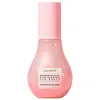What's inside
What's inside
 Key Ingredients
Key Ingredients

 Benefits
Benefits

 Concerns
Concerns

 Ingredients Side-by-side
Ingredients Side-by-side

Water
Skin ConditioningGlycerin
HumectantButylene Glycol
HumectantPropanediol
SolventNeopentyl Glycol Diheptanoate
EmollientEthylhexyl Olivate
Skin ConditioningC9-12 Alkane
SolventMica
Cosmetic ColorantSaccharide Isomerate
HumectantPolyglutamic Acid
Skin ConditioningCoco-Caprylate/Caprate
EmollientSqualane
EmollientDipalmitoyl Hydroxyproline
Skin ConditioningHydrolyzed Sodium Hyaluronate
Skin ConditioningAllantoin
Skin ConditioningGlyceryl Acrylate/Acrylic Acid Copolymer
HumectantPanax Ginseng Root Extract
EmollientSodium Acetylated Hyaluronate
HumectantSorbitan Sesquiisostearate
EmulsifyingSodium Hyaluronate
HumectantSodium Polyacryloyldimethyl Taurate
Emulsion StabilisingSodium Hyaluronate Crosspolymer
HumectantAlanine
MaskingArginine
MaskingGlycine
BufferingHistidine
HumectantIsoleucine
Skin ConditioningPhenylalanine
MaskingProline
Skin ConditioningSerine
MaskingThreonine
Valine
MaskingSclerocarya Birrea Seed Oil
HumectantTremella Fuciformis Sporocarp Extract
AntioxidantAspartic Acid
MaskingPCA
HumectantAvena Sativa Kernel Oil
Skin ConditioningSodium Carrageenan
Emulsion StabilisingPalmitic Acid
EmollientSodium Lactate
BufferingSodium PCA
HumectantPentylene Glycol
Skin ConditioningSorbeth-30 Tetraisostearate
EmulsifyingDipropylene Glycol
HumectantPanthenol
Skin ConditioningSea Salt
AbrasiveSodium Citrate
BufferingSodium Metabisulfite
AntioxidantPPG-8-Ceteth-20
EmulsifyingAcrylates/Beheneth-25 Methacrylate Copolymer
Citric Acid
BufferingTetrasodium Glutamate Diacetate
Phenoxyethanol
PreservativeXanthan Gum
EmulsifyingTocopheryl Acetate
AntioxidantSodium Hydroxide
BufferingEthylhexylglycerin
Skin ConditioningCI 77491
Cosmetic ColorantCI 77891
Cosmetic ColorantWater, Glycerin, Butylene Glycol, Propanediol, Neopentyl Glycol Diheptanoate, Ethylhexyl Olivate, C9-12 Alkane, Mica, Saccharide Isomerate, Polyglutamic Acid, Coco-Caprylate/Caprate, Squalane, Dipalmitoyl Hydroxyproline, Hydrolyzed Sodium Hyaluronate, Allantoin, Glyceryl Acrylate/Acrylic Acid Copolymer, Panax Ginseng Root Extract, Sodium Acetylated Hyaluronate, Sorbitan Sesquiisostearate, Sodium Hyaluronate, Sodium Polyacryloyldimethyl Taurate, Sodium Hyaluronate Crosspolymer, Alanine, Arginine, Glycine, Histidine, Isoleucine, Phenylalanine, Proline, Serine, Threonine, Valine, Sclerocarya Birrea Seed Oil, Tremella Fuciformis Sporocarp Extract, Aspartic Acid, PCA, Avena Sativa Kernel Oil, Sodium Carrageenan, Palmitic Acid, Sodium Lactate, Sodium PCA, Pentylene Glycol, Sorbeth-30 Tetraisostearate, Dipropylene Glycol, Panthenol, Sea Salt, Sodium Citrate, Sodium Metabisulfite, PPG-8-Ceteth-20, Acrylates/Beheneth-25 Methacrylate Copolymer, Citric Acid, Tetrasodium Glutamate Diacetate, Phenoxyethanol, Xanthan Gum, Tocopheryl Acetate, Sodium Hydroxide, Ethylhexylglycerin, CI 77491, CI 77891
Water
Skin ConditioningPropanediol
SolventGlycereth-26
HumectantGlycerin
HumectantNiacinamide
Smoothing2,3-Butanediol
Humectant1,2-Hexanediol
Skin ConditioningCetyl Ethylhexanoate
EmollientCitrullus Lanatus Fruit Extract
Skin ConditioningSodium Hyaluronate
HumectantEclipta Prostrata Extract
Skin ConditioningMelia Azadirachta Leaf Extract
Skin ConditioningPolyglyceryl-3 Methylglucose Distearate
EmulsifyingTromethamine
BufferingGlyceryl Stearate
EmollientCarbomer
Emulsion StabilisingAcrylates/C10-30 Alkyl Acrylate Crosspolymer
Emulsion StabilisingEthylhexylglycerin
Skin ConditioningXanthan Gum
EmulsifyingPolyquaternium-51
Skin ConditioningMoringa Oleifera Seed Oil
EmollientParfum
MaskingBenzyl Benzoate
AntimicrobialWater, Propanediol, Glycereth-26, Glycerin, Niacinamide, 2,3-Butanediol, 1,2-Hexanediol, Cetyl Ethylhexanoate, Citrullus Lanatus Fruit Extract, Sodium Hyaluronate, Eclipta Prostrata Extract, Melia Azadirachta Leaf Extract, Polyglyceryl-3 Methylglucose Distearate, Tromethamine, Glyceryl Stearate, Carbomer, Acrylates/C10-30 Alkyl Acrylate Crosspolymer, Ethylhexylglycerin, Xanthan Gum, Polyquaternium-51, Moringa Oleifera Seed Oil, Parfum, Benzyl Benzoate
 Reviews
Reviews

Ingredients Explained
These ingredients are found in both products.
Ingredients higher up in an ingredient list are typically present in a larger amount.
Ethylhexylglycerin (we can't pronounce this either) is commonly used as a preservative and skin softener. It is derived from glyceryl.
You might see Ethylhexylglycerin often paired with other preservatives such as phenoxyethanol. Ethylhexylglycerin has been found to increase the effectiveness of these other preservatives.
Glycerin is already naturally found in your skin. It helps moisturize and protect your skin.
A study from 2016 found glycerin to be more effective as a humectant than AHAs and hyaluronic acid.
As a humectant, it helps the skin stay hydrated by pulling moisture to your skin. The low molecular weight of glycerin allows it to pull moisture into the deeper layers of your skin.
Hydrated skin improves your skin barrier; Your skin barrier helps protect against irritants and bacteria.
Glycerin has also been found to have antimicrobial and antiviral properties. Due to these properties, glycerin is often used in wound and burn treatments.
In cosmetics, glycerin is usually derived from plants such as soybean or palm. However, it can also be sourced from animals, such as tallow or animal fat.
This ingredient is organic, colorless, odorless, and non-toxic.
Glycerin is the name for this ingredient in American English. British English uses Glycerol/Glycerine.
Learn more about GlycerinPropanediol is an all-star ingredient. It softens, hydrates, and smooths the skin.
It’s often used to:
Propanediol is not likely to cause sensitivity and considered safe to use. It is derived from corn or petroleum with a clear color and no scent.
Learn more about PropanediolSodium Hyaluronate is hyaluronic acid's salt form. It is commonly derived from the sodium salt of hyaluronic acid.
Like hyaluronic acid, it is great at holding water and acts as a humectant. This makes it a great skin hydrating ingredient.
Sodium Hyaluronate is naturally occurring in our bodies and is mostly found in eye fluid and joints.
These are some other common types of Hyaluronic Acid:
Learn more about Sodium HyaluronateWater. It's the most common cosmetic ingredient of all. You'll usually see it at the top of ingredient lists, meaning that it makes up the largest part of the product.
So why is it so popular? Water most often acts as a solvent - this means that it helps dissolve other ingredients into the formulation.
You'll also recognize water as that liquid we all need to stay alive. If you see this, drink a glass of water. Stay hydrated!
Learn more about WaterXanthan gum is used as a stabilizer and thickener within cosmetic products. It helps give products a sticky, thick feeling - preventing them from being too runny.
On the technical side of things, xanthan gum is a polysaccharide - a combination consisting of multiple sugar molecules bonded together.
Xanthan gum is a pretty common and great ingredient. It is a natural, non-toxic, non-irritating ingredient that is also commonly used in food products.
Learn more about Xanthan Gum